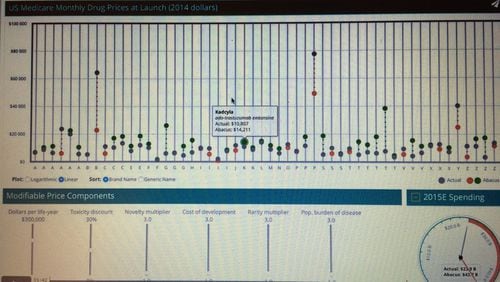It's one of the biggest topics in health care: drug prices.
There's no question that they're going up. But are the increases justified? And what do these increases mean for patients, when some drugs cost $1,000 a pill?
During an online forum for reporters Thursday, Dr. Peter Bach shared a tool he developed called The Drug Abacus, which might help answer some of these questions. The Drug Abacus takes 54 cancer drugs and compares the price charged for each drug to a price based on the value of the drug.
How does Bach determine the value of the drug? He doesn't. But you can. That's the cool thing about the Abacus. It is an interactive tool that allows users to make selections based on their own opinions. For example, if a drug typically adds another year to a patient's life, what is that worth in terms of value? Users decide how much to subtract for bad side effects, and what to add if a drug offers a new approach or treats a rare condition.
Click here to give the Drug Abacus a try.
Credit: Carrie Teegardin
Credit: Carrie Teegardin
Bach is a physician and researcher who directs Memorial Sloan Kettering's Center for Health Policy and Outcomes. His research is focused on pharmaceutical costs and he contends that prices charged for many new drugs do not reflect their value to doctors and patients. He is pushing for that to change at a time when cancer drugs can cost $100,000 a year for one patient.
At Thursday's online forum, organized by the University of Southern California's "Reporting on Health" program, Bach said his research has also found that there has been a 100-fold increase in cancer drug prices since 1965, after adjusting for inflation. It's reasonable to ask, Bach said, are these drugs 100 times better?
Bach did another study to evaluate that. He looked at drugs that gave cancer patients longer lives and calculated how much drug makers charged, over time, when they introduced new drugs that could extend people's lives. He found another sharp increase.
"In 1995, buying a year of life -- if I can be so blunt -- cost about $50,000," Bach said. "In recent years, 2014, it cost $250,000, again adjusted for inflation."
The rising cost of drugs worries many across the nation. More than 7 in 10 Americans said drug costs are unreasonable and that drug companies put their profits before people, said Mollyann Brodie, who leads the Kaiser Family Foundation's public opinion survey program. Brodie, who was also part of the online forum, said Kaiser's August health tracking poll found that the public values prescription drugs. About 6 in 10 Americans surveyed said drugs developed in the past 20 years have improved the lives of the nation's patients.
The poll also found that this is a personal pocketbook issue for many Americans. About half said they currently take a prescription drug, the poll found. Most (72 percent) said they can easily afford their prescriptions, but a quarter of those surveyed said they have difficulty paying for their medications, Brodie said.
The spike in cancer drug prices also has led to a petition asking Congress to take action.








